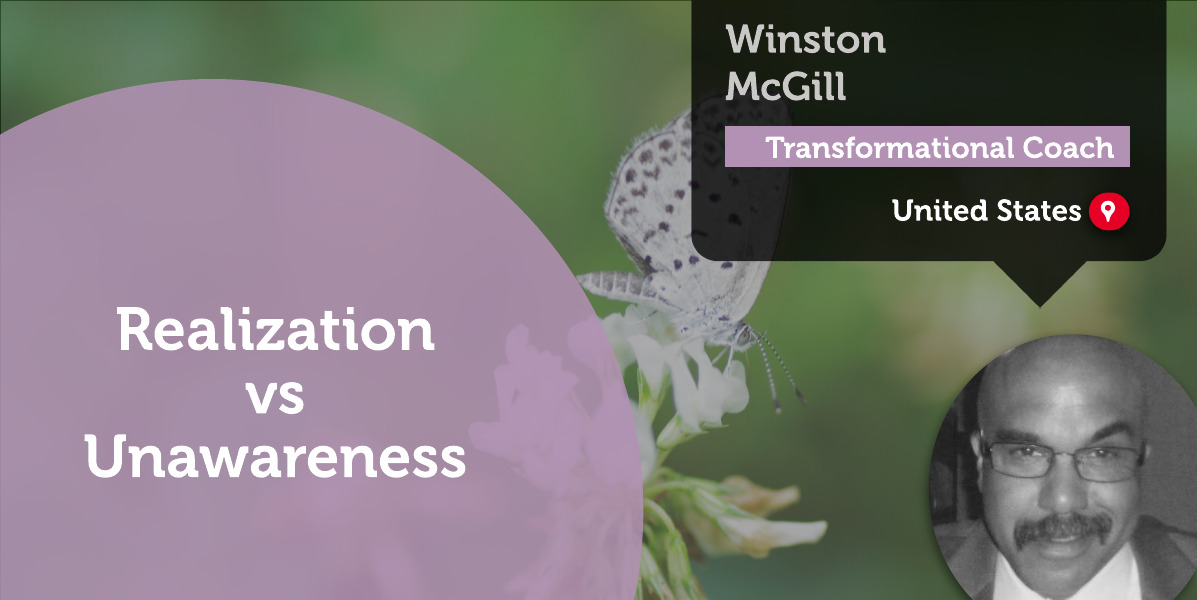A Coaching Power Tool By Winston McGill, Transformational Coach, UNITED STATES

Definitions of Realization
An act of becoming fully aware of something that was a fact.
The fulfillment or achievement of something that is desired or anticipated.
Definition of Unawareness
Unconsciousness results from a lack of knowledge or attention.
A power tool to facilitate positive change is to transition from a state of being unaware to a place of realization. One can be oblivious as to what is causing them to exist in a mode of self-defeat, self-deceit, and negative self-talk. Through effective coaching and powerful questions, a client can start to recognize the self-defeating outlook and move to a mindset of recognizing the behavior and establish strategies and habits to countermand this behavior.
Realization vs. Unawareness to Facilitate Positive Change
Using myself as an example, I became interested in the coaching profession after being forced to retire from the police department because of my age. Knowing that I was still very capable of doing the job, even more effectively than before, I was angry and bitter. I had a very negative outlook. I wanted to continue to work and assist people in need. Obviously, my desire to do this was still very strong. I just had to accomplish this goal in a different arena. Coaching came to mind, but I wasn’t convinced as to its efficacy as it related to me personally.
While on my ICA journey, I surmised that coaching was effective for “some people”, but I really hadn’t eternalized it. It was through peer coaching that I had an epiphany. A realization that the issues, I brought to peer coaching could be clarified and overcome through effective questions and silence.That I, in fact, had the answers. It was at that point that I realized that coaching was in fact a very effective means to overcoming mental obstacles. It was the nexus of realization vs. my previous state of unawareness.
Unawareness may be a term that is a bit misleading. From the coaching perspective, the client is inherently aware but unaware that he or she is aware if that makes sense. Coaching gives the client a space to reflect to go deep inside oneself with a partner acting as a mirror to reflect and ultimately come up with the answers being sought.
Coaching from a position of realization vs unawareness is a powerful position of lending a hand to the client’s understanding of self and ultimately overcoming self-limiting obstacles.
How is the client assisted in this path from unawareness to realization? Primarily from effective open-ended questions that allow space for the client to think deeply and with accountability which the client determines, and the coach reminds.
Again, using myself as an example the coach asked a series of primarily “what” questions then remained silent. This caused me to pause and think deeply on the issues (without pressure), that I brought to the table. I answered a question then thought more deeply on the matter, before being presented with another question. The coach has to approach the matter from a position of not knowing, being curious, caring, and empathetic. As I answered the questions with occasional observations from the coach, I came to various conclusions on my own. The coach then asked accountability questions, in which I determined how I would hold myself accountable, with the coach checking in throughout future sessions.
I find this method of coaching to be very effective in guiding one on the path to self-realization.
In contrast, I’ve also had peer coaches that used a blended method of coaching, in that they would offer suggestions as to a possible resolution to the issue that was presented. What I found happening to me with this method of coaching was a tendency to just go along with the suggestion as opposed to deeper more introspective thought on the matter. I believe that this method while effective in some cases can be counter-productive to a true awareness of oneself and the circumstances surrounding a particular issue.
Using my power tool of realization vs. unawareness can be an effective perspective for the coach so that he or she can ask the proper questions. As I previously stated, the coach should be approaching the client’s dilemma from a point of curiosity/unawareness which in turn promotes thought-provoking actions by the client and ideally an effective solution.
Coaching for Self-Realization: Some WHAT Questions
- What led you to respond in this way?
- What is most meaningful to you about this subject?
- What makes you feel good?
- What do you feel has been revealed to you?
- What would you gain if…..?
These are just a few examples of open-ended, “What” questions, that are thought-provoking to your client and fill that curiosity for you as the coach.
In conclusion, the power tool of realization vs. unawareness is a very effective and intuitive tool to use in partnering with a client to fulfill and awareness as it pertains to the issue at hand.